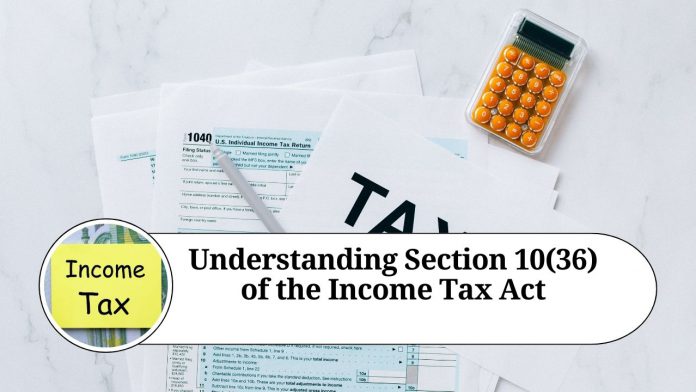Agriculture has been a significant contributor to the Indian economy for centuries. With a majority of the population still living in rural areas and depending on agriculture for their livelihood, the government has always been supportive of the farming community. In line with this, the Income Tax Act provides various exemptions to income earned from agricultural activities. One such exemption is provided under Section 10(36) of the Income Tax Act, which pertains to income from the sale of agricultural land. In this blog, we will discuss Section 10(36) in detail and understand its implications.
What is Section 10(36) of the Income Tax Act?
Section 10(36) of the Income Tax Act provides an exemption on capital gains arising from the transfer of agricultural land. It states that any income arising from the transfer of agricultural land situated in India is exempt from tax under the Income Tax Act. However, there are certain conditions that need to be fulfilled to claim this exemption.
Conditions to Claim Exemption under Section 10(36)
To claim exemption under Section 10(36) of the Income Tax Act, the following conditions need to be fulfilled:
- The land being sold should be agricultural land: The exemption under Section 10(36) is only applicable to agricultural land. Any other type of land, such as commercial or residential land, will not be eligible for the exemption.
- The land should be situated in India: The exemption is applicable only to agricultural land situated in India. Any agricultural land situated outside India will not be eligible for the exemption.
- The land should have been used for agricultural purposes: The land being sold should have been used for agricultural purposes for at least two years before the date of transfer. The land can be used for growing crops, horticulture, animal husbandry, or dairy farming.
- The land should be owned by the seller: The land being sold should be owned by the seller for at least two years before the date of transfer. If the land has been inherited, the period of ownership will be calculated from the date of inheritance.
- The land should not be within the jurisdiction of a municipality, a notified area committee, a town area committee, a cantonment board, or a corporation: If the land being sold falls within the jurisdiction of any of the above local bodies, it will not be eligible for the exemption.
Implications of Section 10(36)
The exemption under Section 10(36) of the Income Tax Act is beneficial for farmers who want to sell their agricultural land. It helps them save a significant amount of tax on the capital gains arising from the sale of such land. The exemption also encourages farmers to continue using their land for agricultural purposes, as they do not have to pay tax on the income arising from the sale of such land.
Conclusion
Section 10(36) of the Income Tax Act is an important provision that provides an exemption on the income arising from the sale of agricultural land. However, it is essential to fulfill all the conditions mentioned under this section to claim the exemption. The exemption is a significant relief for farmers who want to sell their agricultural land and is in line with the government’s objective of supporting the agriculture sector.
Read more useful content:
- section 145 of income tax act
- section 10e of income tax act
- section 9 of the income tax act
- section 94b of income tax act
- section 206aa of income tax act
Frequently Asked Questions (FAQs)
Q. What is Section 10(36) of the Income Tax Act?
Section 10(36) of the Income Tax Act provides an exemption on capital gains arising from the transfer of agricultural land situated in India.
Q. Who is eligible to claim exemption under Section 10(36)?
Any individual or Hindu Undivided Family (HUF) who fulfills the conditions mentioned under Section 10(36) is eligible to claim the exemption.
Q. What is agricultural land?
Agricultural land refers to land that is used for agricultural purposes, such as growing crops, horticulture, animal husbandry, or dairy farming.
Q. Is the exemption under Section 10(36) applicable to commercial or residential land?
No, the exemption under Section 10(36) is only applicable to agricultural land. Commercial or residential land will not be eligible for the exemption.
Q. How long should the agricultural land be used for agricultural purposes to claim the exemption?
The agricultural land being sold should have been used for agricultural purposes for at least two years before the date of transfer.
Q. Can inherited agricultural land be eligible for the exemption under Section 10(36)?
Yes, inherited agricultural land can be eligible for the exemption under Section 10(36). The period of ownership will be calculated from the date of inheritance.
Q. Can agricultural land within the jurisdiction of a municipality, notified area committee, town area committee, cantonment board, or corporation be eligible for the exemption?
No, if the agricultural land being sold falls within the jurisdiction of any of the above local bodies, it will not be eligible for the exemption.
Q. Is there any limit on the amount of capital gains that can be exempted under Section 10(36)?
No, there is no limit on the amount of capital gains that can be exempted under Section 10(36).




















